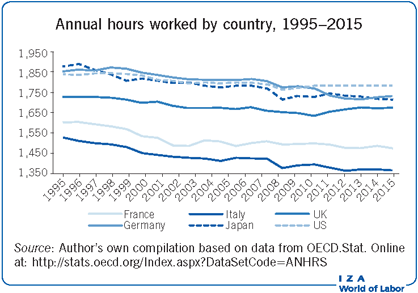Elevator pitch
Working hours across the world are falling, but considerable variation remains. In some countries people work 70% more hours per year, on average, than in other countries. Much of this variation is due to differences in the prevalence of part-time work and patterns of female labor market participation. Looking ahead, the question of how reducing working hours will affect productivity is significant. In addition, how individuals divide up their leisure and work time and what the appropriate work−life balance is in an increasingly technological future are important concerns.

Key findings
Pros
Working hours have been steadily falling in most countries for the last 50 years.
Fewer working hours does not necessarily mean lower total output or lower productivity.
Countries with higher shares of part-time workers tend to have relatively low annual and weekly working hours.
As working hours decrease, workers focus more on work–life balance considerations and how to spend their leisure time.
Cons
The labor markets in many countries are still not very flexible in that hours of work cannot be chosen by many employees.
Not all workers are experiencing fewer working hours; for example, some highly educated workers are now working more hours.
Advanced technology and increasing use of robots is likely to affect the supply of routine jobs and the demand for labor for many low- and semi-skilled workers.
The distributional and welfare implications of fewer working hours are not completely clear and could cause greater inequality.